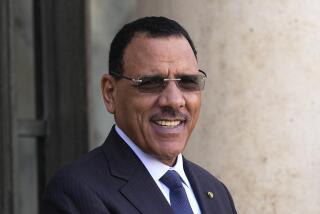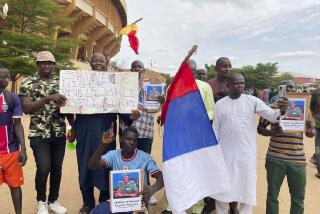Crisis in Nigeria
- Share via
* I entirely agree with the analysis of Nigeria’s importance to the United States in the article by Adonis Hoffman, “Nigeria Heads Towards Civil War, and the World Looks Elsewhere” (Opinion, Aug. 7), but accusing Gen. Sani Abacha of retreating from democracy is unfair.
The political situation in Nigeria is vastly more complex than what the article portrays. The legal authority, which organized the June 12, 1993, election, annulled it before announcing the results and then stepped down. While Chief Moshood K.O. Abiola claimed victory in the election, his opponent, Alhaji Bashir Tofa, never acceded defeat.
The ensuing deep division within the political class persuaded the two political parties that fielded candidates in the election to agree to the formation of a civilian interim national government to prepare the nation for another presidential election. This means, in effect, that the two parties accepted the annulment of the June 12 election.
Unfortunately, the new arrangement did not win nationwide support. Violent protest and strikes in the southwest by people favoring the restoration of the June 12 election persuaded even staunch democrats like Chief Abiola, his running mate Baba Gana Kingibe and several of their associates to canvass for a military intervention to end the drift to chaos and instability.
The collapse of the interim national government, therefore, brought into office the new military government of Gen. Abacha, which immediately ended the disturbances and calmed down passions. They included in the Cabinet people with democratic credentials including Chief Abiola’s vice presidential running mate.
Given these political and legal realities and the potential for large-scale conflict, it would be extremely difficult for the military to transfer power to Chief Abiola on the basis of the June 12, 1993, election. Instead, the government announced a national constitutional conference, which has since convened in Abuja, the capital. It has provided a forum for elected representatives of Nigeria for mutual understanding and accommodation of their conflicting interests, and is preparing the ground for the country to return to democracy. The government is expected to announce a program of return to civil rule on the basis of the outcome of the conference.
It is significant that the recent disturbances and strikes greeting Chief Abiola’s arrest on charges of treason have never been nationwide, but mainly confined to Lagos and, occasionally, to a few other cities in the area. Meanwhile negotiations aimed at settling the crisis continue.
ZUBAIR M. KAZAURE
Ambassador of Nigeria
Washington
More to Read
Sign up for Essential California
The most important California stories and recommendations in your inbox every morning.
You may occasionally receive promotional content from the Los Angeles Times.












